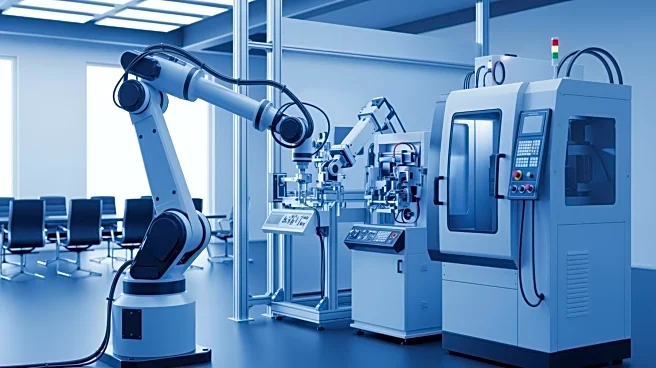What's Happening?
The Iowa Association of Business and Industry hosted its annual manufacturing conference in Altoona, Iowa, where key industry leaders discussed pressing issues such as automation, workforce challenges,
and supply chain management. The conference, attended by 350 participants, featured a panel moderated by Iowa Economic Development Authority Director Debi Durham. Panelists included Megan Weiler Green, CFO at Weiler, Nate Weaton, CEO at Weaton Cos., and Connor Deering, CEO at Cemen Tech. The discussions highlighted the impact of economic uncertainty, international trade policies, and rapid technological changes on Iowa's manufacturing sector, which is the state's largest economic sector. The panelists emphasized the need for increased automation to improve safety and efficiency, as well as the importance of AI in leveraging data for actionable strategies. Additionally, the conference addressed the challenges of finding skilled workers and the potential reshoring of supply chains to mitigate geopolitical risks.
Why It's Important?
The discussions at the ABI Manufacturing Conference underscore the critical role of manufacturing in Iowa's economy, which includes over 4,200 companies and exports goods worth $15.2 billion. The focus on automation and AI reflects a broader trend in the industry towards modernizing operations to remain competitive. Workforce challenges, particularly the need for skilled labor, are significant as they impact the ability of companies to expand and innovate. The emphasis on reshoring supply chains highlights a shift towards domestic production to ensure traceability and reduce dependency on international suppliers, which could have long-term implications for trade policies and economic stability. These developments are crucial for maintaining Iowa's position as a leading manufacturing state and for supporting economic growth and job creation.
What's Next?
The Iowa Manufacturing 4.0 initiative, which has already awarded over $30 million in grants, will continue to support modernization efforts in the industry. The next funding round is set to open earlier than usual, providing more opportunities for companies to invest in new technologies. As automation and AI become more integrated into manufacturing processes, companies will need to adapt their workforce strategies to meet changing skill requirements. The reshoring of supply chains may lead to increased collaboration with domestic suppliers, enhancing product traceability and reducing geopolitical risks. Additionally, Iowa's government may focus on improving conditions such as childcare and housing to attract more workers to the state, addressing the ongoing labor shortage.
Beyond the Headlines
The push for automation and AI in manufacturing raises ethical considerations regarding job displacement and the need for retraining programs to equip workers with new skills. The reshoring of supply chains could lead to a reevaluation of trade policies and international relations, as companies seek to minimize risks associated with global dependencies. Furthermore, the emphasis on traceability and 'Made in the USA' products may influence consumer perceptions and demand, potentially driving a shift towards more locally produced goods. These developments could have lasting impacts on the cultural and economic landscape of Iowa and the broader U.S. manufacturing sector.










